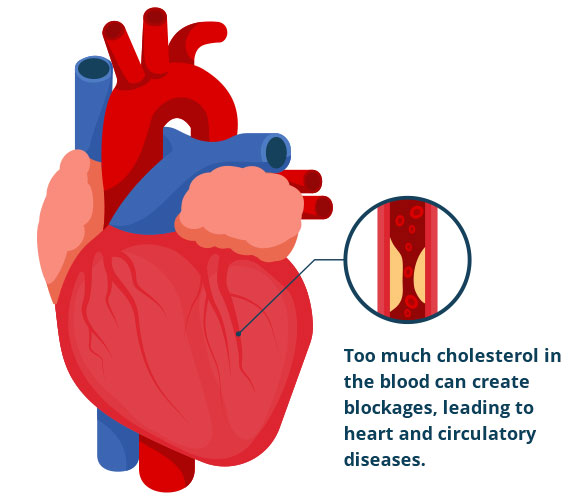
High cholesterol is a prevalent health concern, affecting millions of people globally. It occurs when there’s an excess of low-density lipoprotein (LDL), also known as “bad” cholesterol, circulating in your bloodstream. LDL cholesterol can accumulate on artery walls, forming plaque. This buildup narrows the arteries, hindering blood flow and raising the risk of heart disease and stroke.
The good news is that you can effectively manage cholesterol levels through a combination of lifestyle modifications and, if necessary, medication. Here, we’ll delve into practical strategies to lower your cholesterol and safeguard your cardiovascular health.
Dietary Tweaks for a Heart-Healthy Lifestyle
- Embrace a Balanced Diet: Focus on a well-rounded diet rich in fruits, vegetables, and whole grains. These foods are brimming with fiber, which plays a crucial role in cholesterol reduction. Soluble fiber traps cholesterol in the digestive system, preventing its absorption into the bloodstream. Fruits like apples, pears, and berries, alongside vegetables like Brussels sprouts, okra, and lentils, are excellent sources of soluble fiber. Additionally, incorporate whole grains such as brown rice, quinoa, and oats into your meals.
- Fats: Make Wise Choices: Not all fats are created equal. While saturated and trans fats elevate LDL cholesterol, unsaturated fats contribute to a healthy cholesterol profile. Limit saturated fats, found in fatty meats, full-fat dairy products, and processed foods. opt for lean protein sources like skinless chicken, fish, and beans. Replace saturated fats with unsaturated fats, particularly monounsaturated fats present in olive oil, avocados, and nuts. Additionally, incorporate omega-3 fatty acids, abundant in fatty fish like salmon, mackerel, and sardines, as they offer numerous heart-protective benefits.
- Read Food Labels: Become a label-reading pro! Pay close attention to the cholesterol and saturated fat content when selecting packaged foods. opt for products with lower cholesterol and saturated fat levels. Additionally, be mindful of serving sizes to avoid consuming excessive calories.
- Minimize Added Sugars and Refined Carbs: Excessive intake of added sugars and refined carbohydrates like white bread, pastries, and sugary drinks can elevate LDL cholesterol and triglycerides, another type of blood fat. To curb your intake, limit sugary beverages and processed foods. Choose whole fruits over sugary snacks and opt for whole-grain bread instead of refined varieties.
Incorporating Exercise into Your Routine
Regular physical activity is a potent weapon in your cholesterol-lowering arsenal. Exercise helps:
- Increase HDL (Good) Cholesterol: HDL cholesterol, often referred to as “good” cholesterol, scavenges LDL cholesterol from your arteries and transports it back to the liver for elimination. Engaging in regular exercise promotes an increase in HDL cholesterol levels.
- Burn Calories and Maintain a Healthy Weight: Being overweight or obese can contribute to high cholesterol. Exercise aids in weight management and reduces the risk factors associated with high cholesterol.
Aim for at least 150 minutes of moderate-intensity aerobic activity or 75 minutes of vigorous-intensity aerobic activity spread throughout the week. Additionally, incorporate strength training exercises at least twice a week to target major muscle groups.
Quitting Smoking: A Breath of Fresh Air for Your Heart
Smoking is a significant risk factor for heart disease and high cholesterol. Smoking damages blood vessel walls, making them more susceptible to plaque buildup. Quitting smoking significantly improves your cardiovascular health and reduces your risk of heart disease and stroke.
Stress Management: Keeping Calm for Your Heart’s Sake
Chronic stress can negatively impact your cholesterol levels. When stressed, your body releases hormones like cortisol, which can lead to an increase in LDL cholesterol and a decrease in HDL cholesterol. Explore stress-management techniques like yoga, meditation, deep breathing exercises, or spending time in nature to manage stress effectively.
When Lifestyle Changes Aren’t Enough: Medication
If lifestyle modifications alone aren’t sufficient to control your cholesterol levels, your doctor might recommend medication. Statins are the most commonly prescribed cholesterol-lowering medications. They work by inhibiting the liver’s production of cholesterol. There are other classes of medications available, and your doctor will determine the most suitable option based on your individual needs and medical history.
Regular Checkups: Monitoring Your Progress
Schedule regular checkups with your doctor to monitor your cholesterol levels. This allows for early detection of any issues and timely adjustments to your treatment plan, if necessary.
Conclusion: Empowering Yourself for a Healthy Heart
By adopting a heart-healthy lifestyle that incorporates a balanced diet, regular exercise, stress management, and smoking cessation, you can significantly reduce your cholesterol levels and safeguard your cardiovascular health. Remember, consistency is key. With dedication and the support of your healthcare provider, you can take charge of your heart health and live a long, healthy life.
